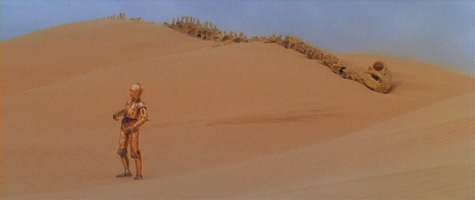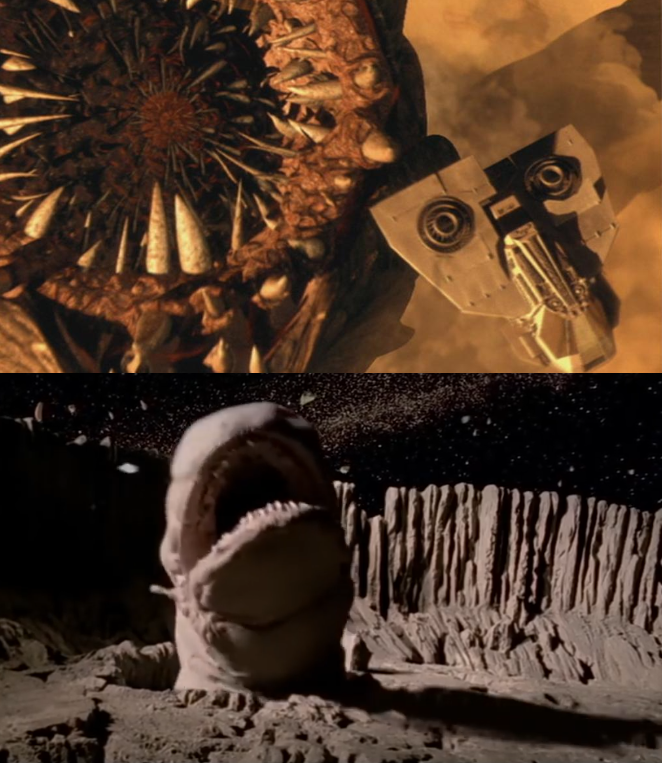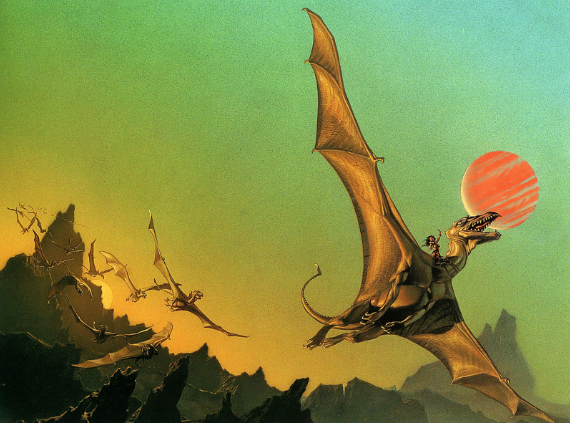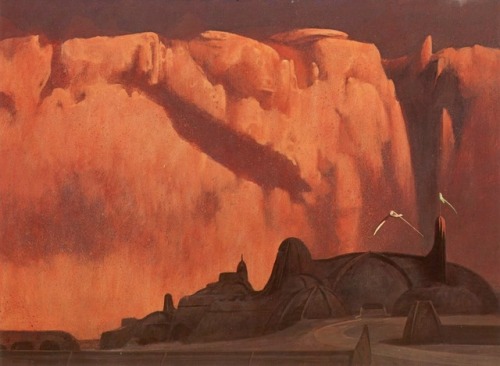
Two songs about angry cyborgs:
284. Fear Factory, “H-K (Hunter-Killer)” (1995):
285. Symphony X, “Dehumanized” (2011):

Two songs about angry cyborgs:
284. Fear Factory, “H-K (Hunter-Killer)” (1995):
285. Symphony X, “Dehumanized” (2011):

Four songs about space travel:
280. Sarah Brightman and Hot Gossip, “I Lost My Heart to a Starship Trooper” (1978):
Yes, that Sarah Brightman. Yes, this exists. In two versions!
This song references Flash Gordon, Darth Vader, droids, Close Encounters of the Third Kind, Starfleet, the Federation, and of course Heinlein’s Starship Troopers – plus the opening notes are borrowed from Also Sprach Zarathustra. It’s like hyper-70s disco filk!
A somewhat more elaborate version:
Incidentally, the notes of “One night in Bangkok and the world’s your oyster” (just that line, not the whole song) seem to be borrowed from this:
One night in Bangkok and the world’s your oyster ….
I lost my heart to a star ship trooper ….
281. Harry Nilsson, “Spaceman” (1972):
282. Lorraine Bowen’s “Space” (2001):
283. Kesha, “Spaceship” (2017):
While Dune’s influence on subsequent science-fiction and fantasy works is vast, the two franchises on which it’s had the most obvious impact in particular are Star Wars and Game of Thrones / Song of Ice and Fire.
Of course SPOILERS for all three series:
Star Wars parallels:


Depriving the giant worm of its tasty flying snack.
Game of Thrones / Song of Ice and Fire parallels:

(Of course another influence on Game of Thrones is Anne McCaffrey’s Dragonrider series. A female protagonist who learns how to ride dragons is the most obvious parallel, but we’ve also got political intrigue in a quasi-feudal but non-Earth setting, and a cyclically recurring existential threat to which dragonfire plus an ancient order of guardsmen are the crucial antidote, but it’s been so long since the threat last manifested that most people dismiss it as a myth.)


Three songs comparing love with space travel:
277. Duke Ellington, “Moon Maiden” (1969):
Written to coincide with the actual moon landing, this song features some clever lyrics with an astronaut’s journey to the moon serving as a metaphor for courtship, and/or vice versa (“I’m just a fly-by-night guy … I made my approach and then revolved”)
You can hear the lyrics more clearly in this version, where he switches from singing them to speaking them:
278. Police, “Walking on the Moon” (1979):
279. Justin Timberlake, “Spaceship Coupe” (2013):

As Denis Villeneuve’s star-studded first installment of what Dune fans hope will be an adaptation of the entire saga or at least a decent chunk of it (though I wonder how contemporary American audiences will react to a story in which the heroes are explicitly Arabic-inflected mujahideen and jihadis fighting to protect their desert world and its one major hyper-lucrative natural resource against foreign imperial powers and corporate cartels) heads toward its premiere some time in 2020 – along with a spin-off tv show about the Bene Gesserit, unaccountably called Dune: The Sisterhood rather than Spice Girls – I thought a quick look back at previous attempts might be worthwhile.
1. In the mid-1970s, Alejandro Jodorowsky began planning what at one point was described as a 14-hour film. Funding fell through and no film was ever produced, but at least an excellent documentary has been made about the project. Jodorowsky’s enthusiasm is infectious, and the film would surely have been memorable (if only because batshit-crazy), but none of the imagery I’ve seen from the project really looks like Dune to me. (The most Dune-looking movie I’ve ever seen is actually Lawrence of Arabia)
2. In 1984, David Lynch’s adaptation lurched onto the screen, to widespread disappointment of fans (including this one). It’s hard to know how much of the blame to assign to Lynch, and how much to studio micromanaging. (There exists both a theatrical cut and an extended cut. Neither was approved by Lynch.) I reckon there’s plenty of guilt to go around. I mean, I’ll grant the film has some good bits – moments when the magic of the original story shines through. But it buries those monents under weird story choices (we hates the Weirding Module forever), horrible casting decisions (including the too-old and too-stolid Kyle MacLachlan as the lead), and one of the most painful opening narration sequences ever inflicted on a hapless audience.
Patrick Stewart fans, listen for his voice at 0:44-48, and watch for his face at 0:54-56, and more clearly at 1:05-07.
3. and 4. The Sci-Fi [as Syfy was then known] Channel’s 2000 miniseries Dune, and its 2003 follow-up Children of Dune (which in fact adapts, if rather hurriedly, both Dune Messiah and Children of Dune), are actually pretty good, and deserve to be better-known than they are. (Most news stories on the Villeneuve project give the impression that the Lynch film was the only predecessor.) But for budgetary reasons, they are shot (by directors John Harrison and Greg Yaitanes) entirely in the studio – against the background of some admittedly quite pretty desert paintings – rather than in any actual desert locations. Imagine Lawrence of Arabia shot that way and you’ll see the problem. (Villeneuve, by contrast, is filming in Jordan.)
Addendum: Incidentally, I found an old comment of mine from 2007:
I remember my sinking feeling at the opening moments of Lynch’s Dune, when Irulan, looking more like Barbie than like a shrewd political operative, started reading blandly and incoherently while her face inexplicably faded in and out against a background of stars. And the rest was no improvement: a rigid, lifeless Paul flying around in a rigid, lifeless ornithopter; Baron Harkonnen’s sore-covered body; weirding modules; the Toto score; a desert that looked more like a waterless beach than the magical Arizona desert or the mysterious Sahara — Aaagh! and I repeat, Aaagh!
[8 December 2019 addendum:]
a) Here’s the opening I complained about above. The actress isn’t as bad as I remembered. But why on earth does she keep fading in and out? And why that bit about forgetting to tell us? It makes her seem a bit scatterbrained, and the Irulan of the books is anything but. (Her dialogue also gets the relation between spice and folding space wrong, but at this point, whatever.)
That’s from the theatrical version. I have to admit that the interminable infodump at the beginning of the extended edition is even worse, not to mention the incredibly lazy low-budget visuals (plus it turns the Butlerian Jihad into a Crusade, with giant crosses to match!):
b) Re the unproduced Jodorowsky version, here’s Jodorowosky explaining that just as a bride needs to be raped to produce a child (who knew?), so Frank Herbert and his book would have needed to be raped to produce his movie – a comment that doesn’t exactly endear to me either Jodorowsky’s vision for Dune or Jodorowsky himself:

Two secret scientific experiments, one governmental and one private. The governmental one is reminiscent of Project X in Atlas Shrugged; the private one, of H. G. Wells’ “The Chronic Argonauts.”
275. Kate Bush, “Experiment IV” (1986):
(So what happened to Experiments I, II, and III? Or is it safest not to ask?)
276. Tom Waits, “What’s He Building In There?” (1999):
| M | T | W | T | F | S | S |
|---|---|---|---|---|---|---|
| 1 | ||||||
| 2 | 3 | 4 | 5 | 6 | 7 | 8 |
| 9 | 10 | 11 | 12 | 13 | 14 | 15 |
| 16 | 17 | 18 | 19 | 20 | 21 | 22 |
| 23 | 24 | 25 | 26 | 27 | 28 | |